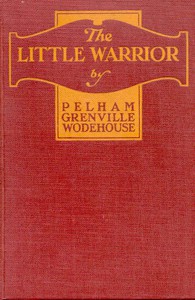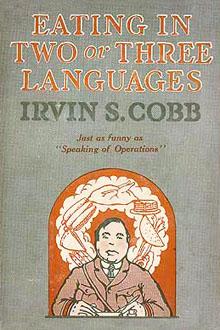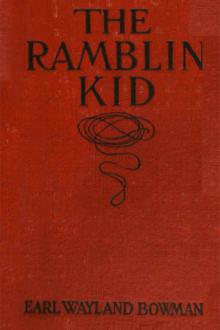The Little Warrior, P. G. Wodehouse [robert munsch read aloud txt] 📗

- Author: P. G. Wodehouse
Book online «The Little Warrior, P. G. Wodehouse [robert munsch read aloud txt] 📗». Author P. G. Wodehouse
“Hello!” said Mr Goble. “All alone?”
Jill was about to say that the condition was merely temporary when the manager went on.
“Come and have a bit of lunch.”
“Thank you very much,” said Jill, with the politeness of dislike, “but I’m waiting for someone.”
“Chuck him!” advised Mr Goble cordially.
“No, thanks, I couldn’t, really.”
The cloud began to descend again upon Mr Goble’s brow. He was accustomed to having these invitations of his treated as royal commands.
“Come along!”
“I’m afraid it’s impossible.”
Mr Goble subjected her to a prolonged stare, seemed about to speak, changed his mind, and swung off moodily in the direction of the grill-room. He was not used to this sort of treatment.
He had hardly gone, when Wally appeared.
“What was he saying to you?” demanded Wally abruptly, without preliminary greeting.
“He was asking me to lunch.”
Wally was silent for a moment. His good-natured face wore an unwonted scowl.
“He went in there, of course?” he said, pointing to the grill-room.
“Yes.”
“Then let’s go into the other room,” said Wally. He regained his good-humor. “It was awfully good of you to come. I didn’t know whether you would be able to.”
“It was very nice of you to invite me.”
Wally grinned.
“How perfect our manners are! It’s a treat to listen! How did you know that that was the one hat in New York I wanted you to wear?”
“Oh, these things get about. Do you like it?”
“It’s wonderful. Let’s take this table, shall we?”
§ 2.They sat down. The dim, tapestry-hung room soothed Jill. She was feeling a little tired after the rehearsal. At the far end of the room an orchestra was playing a tune that she remembered and liked. Her mind went back to the last occasion on which she and Wally had sat opposite each other at a restaurant. How long ago it seemed! She returned to the present to find Wally speaking to her.
“You left very suddenly the other night,” said Wally.
“I didn’t want to meet Freddie.”
Wally looked at her commiseratingly.
“I don’t want to spoil your lunch,” he said, “but Freddie knows all. He has tracked you down. He met Nelly Bryant, whom he seems to have made friends with in London, and she told him where you were and what you were doing. For a girl who fled at his mere approach the night before last, you don’t seem very agitated by the news,” he said, as Jill burst into a peal of laughter.
“You haven’t heard?”
“Heard what?”
“Freddie got Mr Pilkington to put him in the chorus of the piece. He was rehearsing when I arrived at the theatre this morning, and having a terrible time with Mr Miller. And, later on, Mr Goble had a quarrel with the man who was playing the Englishman, and the man threw up his part and Mr Goble said he could get any one in the chorus to play it just as well, and he chose Freddie. So now Freddie is one of the principals, and bursting with pride!”
Wally threw his head back and uttered a roar of appreciation which caused a luncher at a neighboring table to drop an oyster which he was poising in mid-air.
“Don’t make such a noise!” said Jill severely. “Everyone’s looking at you.”
“I must! It’s the most priceless thing I ever heard. I’ve always maintained and I always will maintain that for pure lunacy nothing can touch the musical comedy business. There isn’t anything that can’t happen in musical comedy. ‘Alice in Wonderland’ is nothing to it.”
“Have you felt that, too? That’s exactly how I feel. It’s like a perpetual ‘Mad Hatter’s Tea-Party.’”
“But what on earth made Freddie join the company at all?”
A sudden gravity descended upon Jill. The words had reminded her of the thing which she was perpetually striving to keep out of her thoughts.
“He said he wanted to be there to keep an eye on me.”
Gravity is infectious. Wally’s smile disappeared. He, too, had been recalled to thoughts which were not pleasant.
Wally crumbled his roll. There was a serious expression on his face.
“Freddie was quite right. I didn’t think he had so much sense.”
“Freddie was not right,” flared Jill. The recollection of her conversation with that prominent artist still had the power to fire her independent soul. “I’m not a child. I can look after myself. What I do is my own business.”
“I’m afraid you’re going to find that your business is several people’s business. I am interested in it myself. I don’t like your being on the stage. Now bite my head off!”
“It’s very kind of you to bother about me …”
“I said ‘Bite my head off!’ I didn’t say ‘Freeze me!’ I take the license of an old friend who in his time has put worms down your back, and I repeat—I don’t like your being on the stage.”
“I shouldn’t have thought you would have been so”—Jill sought for a devastating adjective—“so mid-Victorian!”
“As far as you are concerned, I’m the middest Victorian in existence. Mid is my middle name.” Wally met her indignant gaze squarely. “I-do-not-like-your-being-on-the-stage! Especially in any company which Ike Goble is running.”
“Why Mr Goble particularly?”
“Because he is not the sort of man you ought to be coming in contact with.”
“What nonsense!”
“It isn’t nonsense at all. I suppose you’ve read a lot about the morals of theatrical managers …”
“Yes. And it seemed to be exaggerated and silly.”
“So it is. There’s nothing wrong with most of them. As a general thing, they are very decent fellows,—extraordinarily decent if you think of the position they are in. I don’t say that in a business way there’s much they won’t try to put over on you. In the theatre, when it comes to business, everything goes except biting and gouging. ‘There’s never a law of God or man runs north of fifty-three.’ If you alter that to ‘north of Forty-first Street,’ it doesn’t scan as well, but it’s just as true. Perhaps it would be more accurate to say that the Golden Rule is suspended there. You get used to it after you have been in the theatre for awhile, and, except for leaving your watch and pocketbook at home when you have to pay a call on a manager and keeping your face to him so that he can’t get away with your back collar-stud, you don’t take any notice of it. It’s all a game. If a manager swindles you, he wins the hole and takes the honor. If you foil him, you are one up. In either case, it makes no difference to the pleasantness of your relations. You go on calling him by his first name, and he gives you a couple of cigars out of his waistcoat pocket and says you’re a good kid. There is nothing personal in it. He has probably done his best friend out of a few thousand dollars the same morning, and you see them lunching together after the ceremony as happily as possible. You’ve got to make allowances for managers. They are the victims of heredity. When a burglar marries a hat-check girl, their offspring goes into the theatrical business automatically, and he can’t shake off the early teaching which he imbibed at his father’s knee. But morals …”
Wally broke off to allow the waiter to place a fried sole before him. Waiters always select the moment when we are talking our best to intrude themselves.
“As regards morals,” resumed Wally, “that is a different matter. Most managers are respectable, middle-aged men with wives and families. They are in the business to make money, and they don’t want anything else out of it. The girls in their companies are like so many clerks to them, just machines that help to bring the money in. They don’t know half a dozen of them to speak to. But our genial Ike is not like that.” Wally consumed a mouthful of sole. “Ike Goble is a bad citizen. He paws! He’s a slinker and a prowler and a leerer. He’s a pest and a worm! He’s fat and soft and flabby. He has a greasy soul, a withered heart, and an eye like a codfish. Not knocking him, of course!” added Wally magnanimously. “Far be it from me to knock anyone! But, speaking with the utmost respect and viewing him in the most favorable light, he is a combination of tom-cat and the things you see when you turn over a flat stone! Such are the reasons why I am sorry that you are in his company.”
Jill had listened to this diatribe with a certain uneasiness.
Her brief encounters with Mr Goble told her that every word was probably true. She could still feel the unpleasant sensation of being inspected by the eye which Wally had compared—quite justly—to that of a codfish. But her pride forbade any admission of weakness.
“I can take care of myself,” she said.
“I don’t doubt it,” said Wally. “And you could probably take care of yourself if you fell into a muddy pond. But I shouldn’t like to stand on the bank and watch you doing it. I know what girls in the chorus have to go through. Hanging about for hours in draughts, doing nothing, while the principals go through their scenes, and yelled at if they try to relieve the tedium of captivity with a little light conversation …”
“Yes,” admitted Jill. “There has been a good lot of that.”
“There always is. I believe if the stage-carpenter was going to stick a screw in a flat, they would call a chorus-rehearsal to watch him do it … Jill, you must get out of it. It’s no life for you. The work …”
“I like the work.”
“While it’s new, perhaps, but …”
Jill interrupted him passionately.
“Oh, can’t you understand!” she cried. “I want the work. I need it. I want something to do, something to occupy my mind. I hate talking about it, but you know how things are with me. Freddie must have told you. Even if he didn’t, you must have guessed, meeting me here all alone and remembering how things were when we last met. You must understand! Haven’t you ever had a terrible shock or a dreadful disappointment that seemed to smash up the whole world? And didn’t you find that the only possible thing to do was to work and work and work as hard as ever you could? When I first came to America, I nearly went mad. Uncle Chris sent me down to a place on Long Island, and I had nothing to do all day but think. I couldn’t stand it. I ran away and came to New York and met Nelly Bryant and got this work to do. It saved me. It kept me busy all day and tired me out and didn’t give me time to think. The harder it is, the better it suits me. It’s an antidote. I simply wouldn’t give it up now. As for what you were saying, I must put up with that. The other girls do, so why shouldn’t I?”
“They are toughened to it.”
“Then I must get toughened to it. What else is there for me to do? I must do something.”
“Marry me!” said Wally, reaching across the table and putting his hand on hers. The light in his eyes lit up his homely face like a lantern.
§ 3.The suddenness of it startled Jill into silence. She snatched her hand away and drew back, looking at him in wonderment. She was confusedly aware of a babble of sound,—people talking, people laughing, the orchestra playing a lively tune. All her senses seemed to have become suddenly more acute. She was intensely alive to small details. Then, abruptly, the whole world condensed itself into two eyes that were fastened upon hers,—compelling eyes which she felt a panic desire to avoid.
She turned her head away, and looked out into the restaurant. It seemed incredible that all these people, placidly intent upon their food and their small talk, should not be staring at her, wondering what she was going to say; nudging each other and speculating. Their detachment made her feel alone and helpless. She was nothing to them and they did not care what happened to her, just as she had been nothing to those frozen marshes down at Brookport. She was alone in an indifferent world, with her own problems to settle for herself.
Other men had asked Jill to marry them,—a full dozen of them, here and there in country houses and at London before she had met and loved Derek Underhill: but nothing that she had had in the way of experience had prepared her for Wally.





Comments (0)